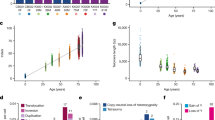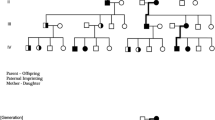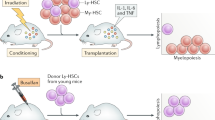Abstract
RECENT work in which clones derived from single haemopoietic cells repopulate the erythroid, myeloid and lymphoid tissues of lethally irradiated mice suggests a common or single stem cell concept for the cells of the haemopoietic system1–3. In man, however, studies of the distribution of the Philadelphia (Ph) chromosome marker of chronic myelogenous leukaemia suggest a common stem cell for erythrocytes and granulocytes and a different stem cell for lymphocytes; this follows from the fact that the Ph chromosome is found in erythrocytic and granulocytic precursors but not in circulating lymphocytes4. We have examined the inter-relationships of the blood cells in normal human subjects, utilizing the mosaicism resulting from X chromosome inactivation ; specifically, we are asking whether erythrocytes (E), granulocytes (G) and lymphocytes (L) arise from common or from different stem cells.
This is a preview of subscription content, access via your institution
Access options
Subscribe to this journal
Receive 51 print issues and online access
$199.00 per year
only $3.90 per issue
Buy this article
- Purchase on Springer Link
- Instant access to full article PDF
Prices may be subject to local taxes which are calculated during checkout
Similar content being viewed by others
References
Barnes, D. W. H., Ford, C. E., Gray, S. M., and Loutit, J. F., in Progress in Nuclear Energy, Series 6, Biol. Sci. (edit. by Bughes, J. G., Coursaget, J., and Loutit, J. F.), 2 (1959).
Trentin, J. J., and Fahlberg, W. J., in Conceptual Advances in Immunology and Oncology, 66 (Hoeber Med. Div., Harper and Row, New York, 1963).
Wu, A. M., Till, J. E., Siminovitch, L., and McCulloch, E. H., J. Exp. Med., 127, 455 (1968).
Whang, J., Frei, E., Tjio, J. H., Carbone, P. P., and Brecher, G., Blood, 22, 664 (1963).
Lyon, M. G., Ann. Rev. Genet., 2, 31 (1968).
Gartler, S. M., and Linder, D., Cold Spring Harbor Symp. Quant. Biol., 29, 253 (1964).
Linder, D., and Gartler, S. M., Science, 150, 67 (1965).
Linder, D., and Gartler, S. M., Amer. J. Human Genet., 17, 212 (1965).
Gartler, S. M., Ziprkowski, L., Krakowski, E. R., Szeinberg, A., and Adam, A., Amer. J. Human Genet., 18, 282 (1966).
Fialkow, P. J., Gartler, S. M., and Yoshida, A., Proc. US Nat. Acad. Sci., 58, 1468 (1967).
Gandini, E., Gartler, S. M., Angioni, G., Argiolas, N., and Dell'Acqua, G., Proc. US Nat. Acad. Sci., 61, 945 (1968).
Beutler, E., Collins, Z., and Irwin, L. E., New Engl. J. Med., 276, 389 (1967).
Gartler, S. M., Gandini, E., Angioni, G., and Argiolas, N., Ann. Human Genet., (in the press).
World Health Organization Technical Report Series, 366 (1967).
Author information
Authors and Affiliations
Rights and permissions
About this article
Cite this article
GANDINI, E., GARTLER, S. Glucose-6-phosphate Dehydrogenase Mosaicism for studying the Development of Blood Cell Precursors. Nature 224, 599–600 (1969). https://doi.org/10.1038/224599a0
Received:
Revised:
Issue Date:
DOI: https://doi.org/10.1038/224599a0
This article is cited by
-
Chimaerism in the Immune System of Tetraparental Mice
Nature New Biology (1972)
Comments
By submitting a comment you agree to abide by our Terms and Community Guidelines. If you find something abusive or that does not comply with our terms or guidelines please flag it as inappropriate.



